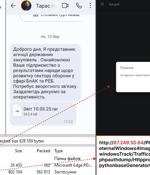Security News

Counterfeit Facebook pages and sponsored ads on the social media platform are being employed to direct users to fake websites masquerading as Kling AI with the goal of tricking victims into...

Cybersecurity researchers have shed light on a new malware campaign that makes use of a PowerShell-based shellcode loader to deploy a remote access trojan called Remcos RAT. "Threat actors...

A malicious Python package targeting Discord developers with remote access trojan (RAT) malware was spotted on the Python Package Index (PyPI) after more than three years. [...]


Let the espionage and access resale campaigns begin (again) A cyberspy crew or individual with ties to China's Ministry of State Security has infected global organizations with a remote access...

A threat actor with ties to Pakistan has been observed targeting various sectors in India with various remote access trojans like Xeno RAT, Spark RAT, and a previously undocumented malware family...

Despite arrests, eight-legged menace targeted more victims this year Despite several arrests last year, Scattered Spider's social engineering attacks are continuing into 2025 as the cybercrime...

A RAR file, a fake summons, and a Nietzsche quote—all part of a multi-stage malware chain delivering DCRat & Rhadamanthys. Acronis TRU breaks down how attackers use VBS, batch, and PowerShell...

Entities in Ukraine have been targeted as part of a phishing campaign designed to distribute a remote access trojan called Remcos RAT. "The file names use Russian words related to the movement of...

The Computer Emergency Response Team of Ukraine (CERT-UA) is warning of a new campaign that targets the defense sectors with Dark Crystal RAT (aka DCRat). The campaign, detected earlier this...